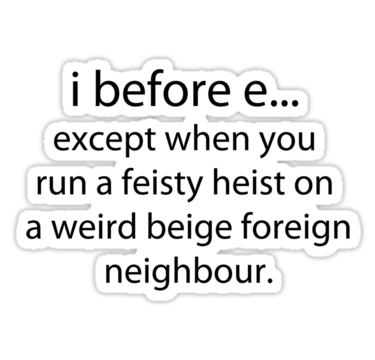Go Away, Grammar Police!
 Grammar rules are made to often be broken. Eeeeek, if the grammar police were around and about I’d be going to prison for using a split infinitive in that heading, but in defence of my crime I would argue that some rules of grammar have become obsolete (and for good reason too!)
Grammar rules are made to often be broken. Eeeeek, if the grammar police were around and about I’d be going to prison for using a split infinitive in that heading, but in defence of my crime I would argue that some rules of grammar have become obsolete (and for good reason too!)
All Star Trek fans will know the intro “To boldly go where no man has gone before”, which is the perfect example of a split infinitive in its simplest form as it puts an adverb (boldly) between ‘To’ and a verb (go).
This rule came about from ye olde days when we spoke Latin, and to split an infinitive was impossible to do. But with Latin now dead and the evolution of language, most English usage guides have realised it’s not a crime against grammar and dropped its objections to the action.
There are some grammar rules drummed into us from days of yore that don’t make any sense at all, and thankfully with the relaxation of the language code of conduct, these are becoming more and more obsolete. For instance, these days it’s perfectly acceptable to start a sentence with a conjunction like ‘And’ or ‘But’ and ‘For’!
And ending a sentence with a preposition is also quite often heard of! Theoretically, it’s slightly frowned upon due to the rather weak finale to a sentence, and it does hark back to Latin where it wasn’t possible to do as part of a sentence construction. But once again, it’s structurally correct.
One-sentence paragraphs have also been frowned upon in educational facilities, as they are considered too short to convey enough meaning – but if it’s good enough for famous authors like Charles Dickens, John Milton, Francis Bacon and George Eliot, it should be good enough for us too.
 Another common grammar rule that is no longer taught at schools is the catchy "i before e, except after c”. Generation upon generation learned this little ditty and applied it to their studies, but in 2009 schools in the United Kingdom were dissuaded from doing so, as it turned out there were almost 21 times the number of rule-breaking words than those that conformed to it.
Another common grammar rule that is no longer taught at schools is the catchy "i before e, except after c”. Generation upon generation learned this little ditty and applied it to their studies, but in 2009 schools in the United Kingdom were dissuaded from doing so, as it turned out there were almost 21 times the number of rule-breaking words than those that conformed to it.
Here are just a few examples: counterfeit; weird; veil; receive; protein; species; rein; seismic; and height, but with so many to choose from, I bet you can come up with a dozen or more of your own!


